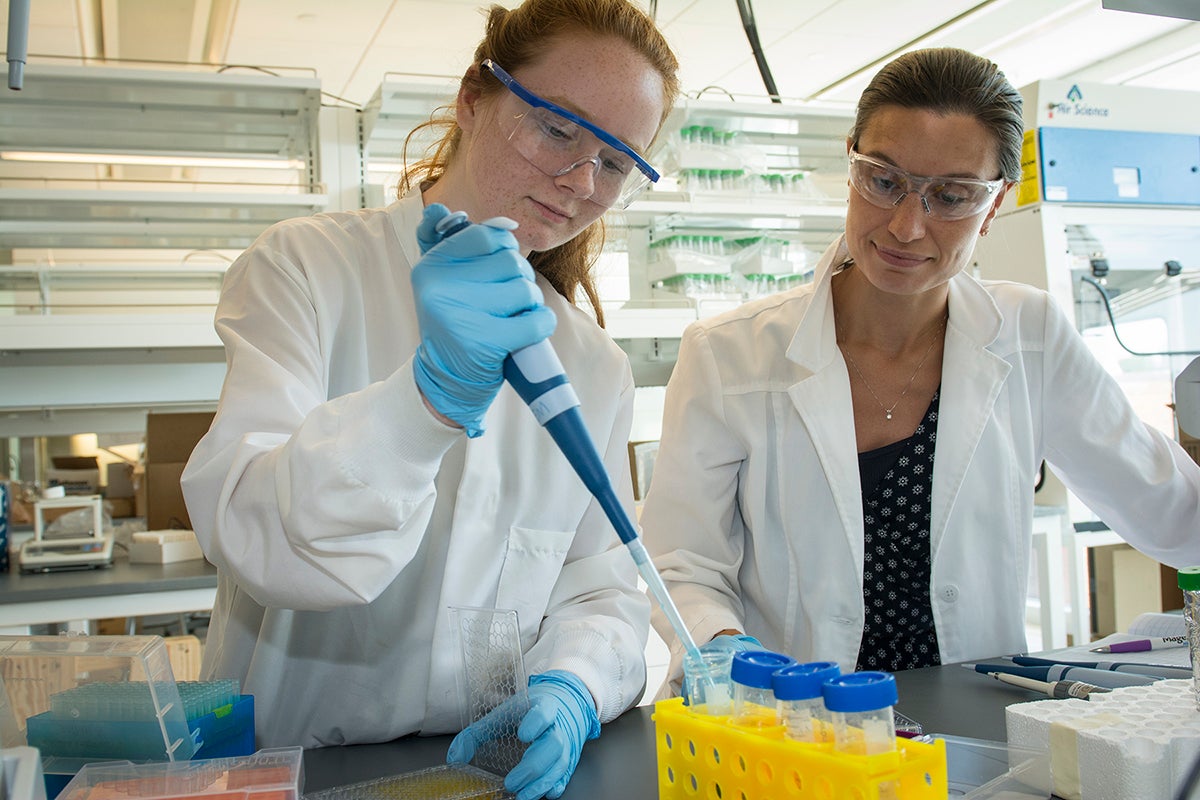KINGSTON, R.I. – August 29, 2016 – Rachel Carley, a Summer Undergraduate Research Fellow (SURF) at the University of Rhode Island and third-year pharmacy student, has worked on a discovery that could help patients with cholestasis, a condition that impairs the flow of bile (a digestive fluid) from the liver.
Carley spent the summer working with fellow South Kingstown High School alumna, URI Assistant Professor of Biomedical and Pharmaceutical Sciences Nisanne Ghonem, testing whether fenofibrate, known more commonly by the brand name Tricor, reduces inflammation. If left untreated, liver inflammation can lead to fibrosis, cirrhosis and end-stage liver disease or malignancies in the liver, bile duct or gallbladder. It can also lead to colon cancer.
“Coming from the pharmacy side, I want to know how drugs do what they do,” Carley said. “You are basically asking how does this happen and how do we come to understand this? This is the real-world application of what we are learning in the classroom.”
Carley was one of more than 100 students from universities and colleges around the state who participated in summer research fellowships thanks to two, multi-million dollar federal grants awarded to URI. They presented their research at the SURF Conference earlier this month.
Ghonem explained that fenofibrate is approved by the U.S. Food and Drug Administration to treat high cholesterol, and that over the years, clinicians have also observed in patients with cholestatic liver diseases that their symptoms have diminished while on the drug. Ursodeoxycholic acid is one of the few therapies available for cholestasis, but many patients do not improve on that medication and, for some types of cholestasis, the drug does not improve survival rates. Thus the need for alternative therapies, such as fenofibrate.
While inflammation is the body’s normal immune response to disease or injury, too much leads to a wide range of conditions, like cardiac disease, cancer, arthritis and Alzheimer’s.
In the case of cholestatic liver diseases, inflammation is regulated by macrophages, also called liver kupffer cells, which release cytokines and chemokines, small proteins activated by the immune response. One of Ghonem’s research goals is to determine if fenofibrate inhibits the production of cytokines and chemokines, thereby reducing inflammation, as a means of improving the excretion of toxins in bile and reducing liver injury. She and Carley established cell culture models in the laboratory to test these effects of fenofibrate.
“Preliminarily, we have found that fenofibrate reduced the secretion of human pro-inflammatory cytokines and chemokines in laboratory tests,” Carley said in her research summary.
The medication targets the nuclear receptor PPARalpha, which is highly expressed in the liver and has been shown to inhibit inflammation. Ghonem and Carley examined cells exposed to the drug and compared the inflammatory response to those not exposed. “We were able to culture human macrophages and simulate the response to inflammation. We knew that fenofibrate turned on PPARalpha, but we wanted to know how that action relates to cholestasis,” Carley said. “We believe that the drug exerts anti-cholestatic actions (in humans) partly through its anti-inflammatory mechanisms.”
“I performed a lot of cell culture during this time,” Carley said. “With bench (research) work, it is imperative to reproduce results so you get to do tasks repetitively and you get really good at them.”
“Her being able to understand the experimental process and then present to her peers and other research scientists are some of the advantages of this fellowship. She learned cell culture techniques and how to perform experiments and conduct data analysis,” her professor said.
“I loved it because I was able to spend so much time one-on-one with Dr. Ghonem,” Carley said.
Carley has completed her summer fellowship, but will continue working with Ghonem as the new academic year begins. Dr. Ghonem continues to collaborate with the Yale University Hepatology (the study of the liver) Clinic, to investigate the anti-inflammatory actions of fenofibrate in patients with cholestatic liver diseases.
For Ghonem, it was a great learning experience, too, as the new faculty member was setting up her lab when she applied to the SURF program. She had nothing but superlatives to describe Carley.
“She is an excellent student with an interest in pharmacology-based research,” Ghonem said. “She is driven, motivated and enthusiastic. It’s been an absolutely wonderful experience, and I am glad that she is staying to continue working on the project.”

